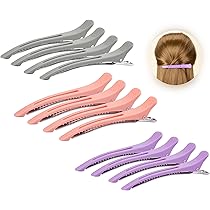Ever looked at that little plastic or metal tool that hairstylists use and thought, “What’s the big deal?” Meet the hairdressing clip—tiny but mighty. These unsung heroes of the salon world are more than just bits of plastic and spring. They’re essential for achieving precision, clean sections, killer hairstyles, and those flawless highlights you love. Whether you’re a pro stylist or someone just winging it at home, let’s unlock the world of hairdressing clips.
What Is a Hairdressing Clip, Anyway?
In the simplest terms, a hairdressing clip is a tool designed to hold hair in place. But don’t be fooled—these clips are built to withstand thick sections, wet hair, heat, and repetitive use. They’re engineered for functionality, comfort, and control.
Types of Hairdressing Clips
Not all clips are created equal. From sleek sectioning tools to sturdy clamps, here’s the breakdown.
Sectioning Clips
These are your go-to clips for cutting, coloring, or styling in parts. Think of them as bookmarks for your hair—they help keep sections neat and manageable.
Alligator Clips
Named for their toothy, jaw-like design, these bad boys grip like nobody’s business. Ideal for thick or coarse hair, they’re commonly used during blowouts and styling.
Duckbill Clips
Flat and long with a smooth hold, duckbill clips are perfect for creating clean partings without disturbing the hair.
Butterfly Clips
Remember those chunky Y2K-style clips? Butterfly clips are a comeback queen. Stylists use their strong spring action for quick sectioning, especially on thick or curly hair.
Why Hairdressers Swear by Them
Precision and Control
Ever tried cutting or coloring hair without clips? It’s chaos. Clips allow stylists to work in clean layers, making every cut deliberate and every color stroke perfect.
Speed and Efficiency
With sections clipped away, you’re not constantly fighting stray hairs.Nothing shifts out of place, making the whole process significantly faster.
Versatility in Styles
From sleek buns to messy braids, clips help anchor hair while building a masterpiece.It’s as if you’ve got an extra pair of hands keeping everything steady.
How to Use Hairdressing Clips Like a Pro
Prepping for a Haircut
Section off the hair into quadrants—top, back, and sides. Use clips to separate each part. This creates a roadmap for precision cutting.
Styling Techniques
Curls and Waves
Want bombshell curls? Use clips to hold rolled-up hair sections while they cool. This locks in shape and bounce.
Updos and Braids
For intricate braids or updos, clips keep sections separated while you style. They’re a lifesaver for weddings or special occasions.
Coloring and Highlighting
Clips make highlighting a breeze. Separate strands, foil them, and clip them out of the way. No mess, no missed strands.
Best Materials for Hairdressing Clips
Plastic vs. Metal
Plastic clips are lightweight and heat-resistant—ideal for blow-drying. Metal clips offer stronger tension and are great for thick or stubborn hair.
Teeth Grip and Tension
Choose clips with built-in teeth or textured grips—they offer a stronger hold and stay put, even on thin or slippery hair.
Choosing the Right Clip for Your Hair Type
Thick Hair
You need strong, large clips—think alligator or butterfly styles. They can handle volume without snapping.
Thin or Fine Hair
Smaller, smooth clips with gentle tension work best here. Avoid overly tight grips—they can cause breakage.
Curly or Textured Hair
Wide-tooth clips or butterfly clips help manage dense curls without tugging or frizzing.
Hairdressing Clips at Home vs. Salon
Salon-grade Tools at Home
With online shopping booming, salon-quality clips are now accessible to everyone. They’re a game-changer for DIY color or styles.
Are Cheap Clips Worth It?
You get what you pay for. Cheap clips often snap, lose grip, or rust. Invest a little more for quality and durability.
Maintenance Tips: Make Them Last
Cleaning Your Clips
Wipe them down after each use. For buildup or product gunk, soak in warm water with mild soap, then air dry.
Storing Them Safely
Don’t just toss them in a drawer. Use a clip holder or small container to avoid tangling or damage.
Popular Brands Hairdressers Love
Pro Tools That Get the Job Done
Some fan favorites include:
- Y.S. Park – Known for quality and pro-approved designs
- Framar – Great for coloring work
- Cricket – Affordable and sturdy
- Drybar – Sleek and salon stylish
Where to Buy Hairdressing Clips
You can snag professional clips at:
- Beauty supply stores (Sally Beauty, Ulta)
- Amazon
- Direct from brands like Framar or Y.S. Park
- Local salons or hair distributors
Final Thoughts: Small Clip, Big Impact
Hairdressing clip may look unassuming, but they pack a powerful punch in the world of hair. Whether you’re sectioning off hair for a dramatic dye job or just holding back bangs while applying makeup, these clips are a must-have. The right clip can make or break your styling routine. So, next time you see one lying around, show it some love—it’s doing more heavy lifting than you think.
FAQs
1. Can I use hairdressing clips on wet hair?
Absolutely! Just make sure they’re non-slip and made of rust-proof materials like plastic or stainless steel.
2. How do butterfly clips differ from alligator clips?
Butterfly clips use spring action to clamp hair tightly, perfect for thick hair. Alligator clips have a longer, more secure grip with a toothed design for sectioning and blow-drying.
3. Are hairdressing clips safe for kids?
Yes, but opt for soft-grip plastic ones without sharp teeth. Always supervise during use.
4. Do clips work for all hair types?
Yes, but the clip type matters. Curly, thick, and fine hair all benefit from specific designs—choose accordingly.
5. How many clips do I need for a full hairstyle?
Generally, 4–6 clips are enough for basic sectioning. Complex styles might need 8–10 depending on the hair’s thickness and length.

